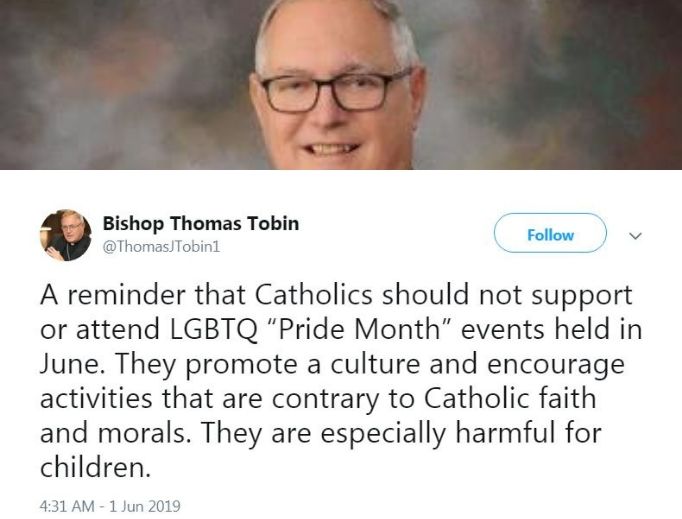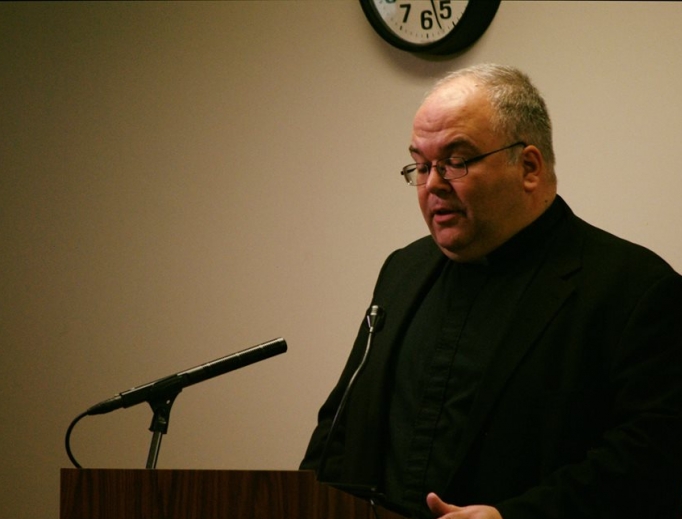Courage’s Father Bochanski Addresses Bishop Tobin’s Remarks on ‘Pride’ Month
The director of the apostolate for same-sex-attracted Catholics said the bishop was affirming Church teaching when he advised on social media that Catholics shouldn’t participate in ‘Pride Month’ celebrations.

Bishop Thomas Tobin of Providence, Rhode Island, sparked a firestorm of controversy when he tweeted recently that “Catholics should not support or attend LGBTQ ‘Pride Month’ events held in June” because they “promote a culture and encourage activities that are contrary to Catholic faith and morals” and “are especially harmful for children.”
But according to Father Philip Bochanski, the head of Courage International, a Catholic apostolate to same-sex-attracted Catholics, Bishop Tobin’s remarks were in line with Catholic teaching on the controversial issue.
The tweet met with swift backlash, including from prominent celebrities and television personalities. Despite criticism of the tweet from actress Mia Farrow and Sunny Hostin of The View, many came to the bishop’s defense and argued that he was simply stating Catholic teaching.
Bishop Joseph Strickland of Tyler, Texas, stated that “Bishop Tobin is simply speaking for one truth of the deposit of faith. God made humans male & female. Certainly those who are confused about their identity need Christ’s love & compassion; let’s remember Christ’s love is expressed when [he] dies on the cross for the truth.”
In a subsequent statement, Bishop Tobin said that he regretted “that my comments yesterday about Pride Month have turned out to be so controversial in our community, and offensive to some, especially the gay community. That certainly was not my intention, but I understand why a good number of individuals have taken offense.”
Bishop Tobin emphasized that the Catholic Church “has respect and love for members of the gay community, as do I. Individuals with same-sex attraction are beloved children of God and our brothers and sisters.” He concluded that “as a Catholic bishop, however, my obligation before God is to lead the faithful entrusted to my care and to teach the faith, clearly and compassionately, even on very difficult and sensitive issues. That is what I have always tried to do — on a variety of issues — and I will continue doing so as contemporary issues arise.”
Church Teaching
The Catechism of the Catholic Church states that “homosexual acts are intrinsically disordered” because “they close the sexual act to the gift of life” and “do not proceed from a genuine affective and sexual complementarity.” The Catechism emphasizes that “under no circumstances” can such acts be approved but acknowledges the genuine struggle and the need to love a person with such inclinations.
“Homosexual persons are called to chastity,” it adds. “By the virtues of self-mastery that teach them inner freedom, at times by the support of disinterested friendship, by prayer and sacramental grace, they can and should gradually and resolutely approach Christian perfection.”
This is not the first time that a Church leader has spoken out against such events. In the year 2000, Pope St. John Paul II condemned a “Gay Pride” festival that occurred in Rome.
'”In the name of the Church of Rome, I cannot not express bitterness for the affront to the Grand Jubilee of the year 2000 and for the offense to the Christian values of a city that is so dear to the hearts of Catholics across the world,” he said in an address. “Homosexual acts are against nature’s laws,” he added. “The Church cannot silence the truth, because this … would not help discern what is good from what is evil.”
Unjust Discrimination
Father Bochanski, of Courage International, told the Register that Bishop Tobin was “simply trying to state the teaching of the Church, but his statement was misinterpreted,” as “the very brief nature of a tweet doesn’t allow for a lot of nuance.”

He proceeded to point out the Church’s clear condemnation of unjust discrimination toward same-sex-attracted individuals and the distinction between that and the Church’s teachings on homosexual actions.
“Organizers of ‘pride’ events, at least in the beginning of things, would see their importance as reflecting the message of the Stonewall Riots — which happened 50 years ago this month — that it’s wrong and harmful for people to be discriminated against, treated harshly, be the object of violence or malice, because of their sexual attractions,” he explained. “In their origins I think there were and perhaps still are some pride events that really start from that perspective of raising awareness about the sinfulness of unjust discrimination; and that’s a position that’s always been clear in the teaching of the Church on homosexuality.”
He quoted the Catechism’s teaching that “the number of men and women who have deep-seated homosexual tendencies is not negligible. This inclination, which is objectively disordered, constitutes for most of them a trial. They must be accepted with respect, compassion and sensitivity. Every sign of unjust discrimination in their regard should be avoided.”
Father Bochanski went on to quote a 1986 letter on the “Pastoral Care of Homosexual Persons,” signed by then-Cardinal Joseph Ratzinger, which went even further than the Catechism, saying that “it is deplorable that homosexual persons have been and are the object of violent malice in speech or in action. Such treatment deserves condemnation from the Church's pastors wherever it occurs. It reveals a kind of disregard for others which endangers the most fundamental principles of a healthy society. The intrinsic dignity of each person must always be respected in word, in action and in law.”
Father Bochanski argued that “if there are some events that are trying to draw awareness to unjust discrimination, to violence or malice, then the intention of those events is consistent with the intention of the Church when she tells us that all unjust discrimination must be avoided.”
However, he added that “the CDF [Congregation for the Doctrine of the Faith] goes on to say in that letter that the answer to that is not to say that there’s nothing morally wrong with homosexual relationships, but the answer is to explain the Church’s teaching more clearly.” He added that members of the Courage apostolate attend pride parades, “not as participants and marchers; but they are there sometimes with a table or a booth along the parade route with signs and with literature and with rosaries or prayer books bringing the message to people that God loves all of his children, that he calls us to holiness and chastity.”
Father Bochanski also highlighted the potential for scandal present in pride events. “Because there are people coming from different perspectives and with different intentions, there’s evidence enough to say that in some places some people involved in these parades engage in behavior that is lewd or can give scandal, and especially for younger people.”
“I think when we’re talking about a big event like a parade, there’s just too much of a possibility for some people to misuse an event like that to do things that are sinful and scandalous,” he emphasized. “Parents ought to be very concerned about exposing their children to things that they can’t control and that neither the parent nor the children might be prepared to see.”
Symbols and Labels
As to the use of symbolism like rainbow flags, Father Bochanski cautioned that such symbols could easily be misinterpreted.
“It’s perfectly possible for a person who is experiencing same-sex attraction to live a chaste life according to their state in life,” he said. “Sometimes they’ll make a decision to use a symbol like a flag or a label like ‘gay Catholic,’ hoping that that will convey what they mean.”
But he explained that there is the danger of ambiguity in the use of such symbols and words.
“Most people would tend to assume the opposite, to assume that they’re using a label or a symbol in order to identify with a community of people who generally are not following the Church’s teaching about sexual morality in this area and generally not talking about chastity, generally are engaging in same-sex relationships,” he pointed out.
Father Bochanski said there should be a dialogue on the matter, questioning whether people are fulfilling the “responsibility to give good example to others if the label or the symbol you’re using — is at least highly possible that it — can send a mixed message or actually the opposite of the message that you’re trying to convey.”
“It would probably be better in most cases to stay away from labels or symbols that can be misinterpreted,” he said, “and to try to speak more precisely so that people understand you know what a person stands for and that they’re pursuing chastity and inviting other people to do the same.”
A True Pastoral Approach
Not being true to Church teaching is scandalous, Father Bochanski emphasized.
Father Bochanski said it was “a seriously scandalous departure from the consistent teaching of the word of God that’s conveyed through the Church” for a priest or a bishop “to say that this is how God makes someone or this is who a person is.”
He called the teaching of the Catechism “extraordinarily clear that same-sex actions, homosexual actions are always wrong,” and “what that means is it’s not a prudential judgment and it’s not a teaching that’s connected to one time or place in history.”
“If that teaching is true that homosexual actions are always wrong, then it cannot be theologically true that God creates a person and gives them an attraction to homosexual relationships. God cannot create a person and give that person an inborn, unchangeable attraction to something that’s inherently sinful,” he argued. “It’s not how God works.”
“I think that priests want to be compassionate to people, they don’t want to offend or hurt or seem to condemn anyone, and so if they don’t have a way to convey that teaching with clarity and with charity, then sometimes they’re silent about it,” he explained. “Sometimes they’re ambiguous about it; sometimes they kind of go along with the prevailing attitude of the culture.”
He quoted the 1986 CDF letter once again, which stated that “departure from the Church’s teaching, or silence about it, in an effort to provide pastoral care is neither caring nor pastoral. Only what is true can ultimately be pastoral. The neglect of the Church’s position prevents homosexual men and women from receiving the care they need and deserve.”
Father Bochanski echoed the words of Pope Francis, saying that in terms of the faithful reaching out to those with same-sex attraction during the month of June, “we ought to accompany people starting from their situation and also share with them our deep faith that God has a plan for their lives, which is aimed towards their fulfillment and their happiness.”
“We listen to their stories, we greet them with love, and we help them to see their story in light of the story of our creation and redemption by Christ,” he added.
He pointed out that the month of June is dedicated to the Sacred Heart of Jesus, and “we know he understands all of our desires from experience; he has lived with a human heart; he still has a human heart and our human heart — our human nature is now right at the heart of the Trinity itself.”
Father Bochanski said that this “firm assurance that God knows our desires” could provide an easier context “to convey the Church’s teaching to people who are living with this experience of same-sex attraction.”
Lauretta Brown is the Register’s Washington-based staff writer.
- Keywords:
- bishop thomas tobin
- church teaching on sexuality
- courage international
- father philip bochanski
- lauretta brown
- pride events
- same-sex attraction
- same-sex-attracted catholics

















